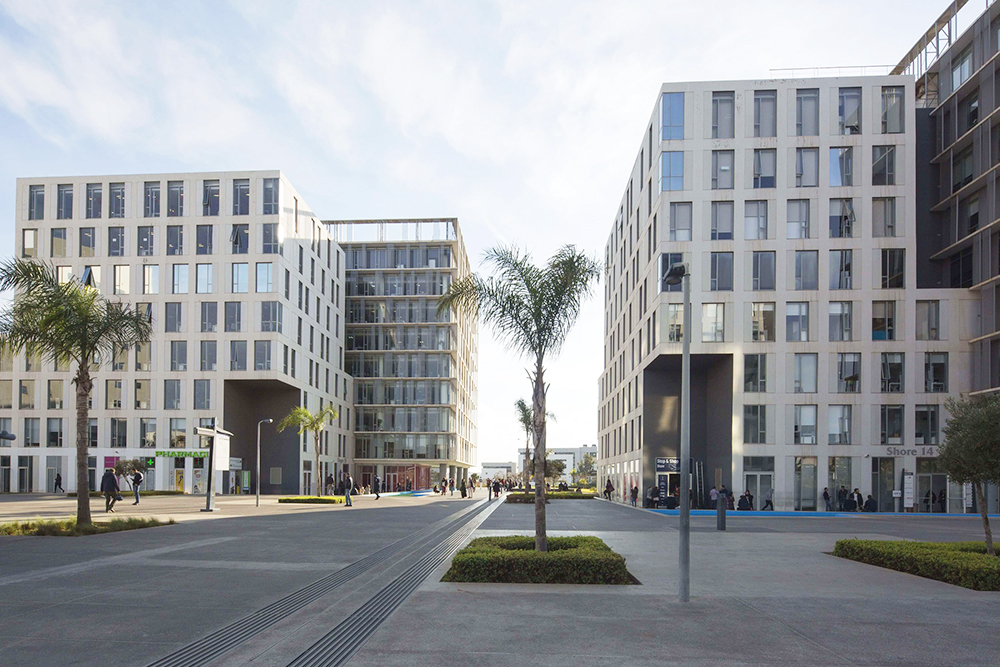The best-shore destination for
added-value outsourcing

Connectivity and outstanding multilingual talent make Morocco a preferred location for investors in high-tech offshore services.
SHARE THIS ARTICLE:

Outsourcing is among Morocco’s most dynamic industries, with the rapidly expanding sector growing at an average annual rate of 8 percent to record a turnover of $1.4 billion in 2021. Currently, the sector employs more than 120,000 people and that figure is increasing by around 10,000 a year as the market continues to mushroom in size.
Morocco is recognized as a regional offshoring leader across customer relationship management, business and knowledge processing, information technology (IT) and engineering services, while nearly 20 percent of the latest jobs to be created have been in the latter two areas, particularly in high value-added mechanical and software engineering.
Numerous multinationals have established flourishing offshore-service bases in the kingdom, including Capgemini, Bosch, Accenture, Dell, HP, IBM, PwC and Webhelp, the global specialist in digital business process outsourcing. “Morocco was Webhelp’s first offshore location and remains the most important one. We started our activity in Rabat 20 years ago with 100 employees. Today, we have reached 10,500 employees spread over 15 sites in seven cities of the kingdom,” says Redouane Mabchour, managing director of Webhelp Morocco.
When asked, most international companies will give the same key reasons for investing in the country: government support, connectivity and workforce quality. Morocco ranks first in North Africa on the Global Connectivity Index and many investors make the most of that by establishing themselves in one of the country’s five dedicated one-stop-shop outsourcing business parks that offer state-of-the-art IT infrastructure and competitive fiber-optic telecom connections, as well as access to renewable energy supplies. The kingdom’s geographical proximity to Europe means it is also quick and easy to physically connect with international headquarters and clients.
Additionally, the workforce available to the sector “has been a clear factor in the kingdom’s rapid growth over the past decade as an offshore location, offering contractors a quality performance that equals or even exceeds internal inshore operations,” according to Didier Manzari, CEO of the leading services provider Comdata Morocco. “They offer impressive expertise in areas such as IT development, project management, training and management. What also differentiates Morocco from many other markets are the soft skills in the workforce, and people’s facility for offering excellent customer service. In addition, we see a high degree of adaptability and ambition across the talent pool.”
The country’s population is young—39 percent of its citizens are between 20 and 45 years old—and it is multilingual. Commonly spoken languages include Arabic, English, Spanish and 35 percent of Moroccans speak French, which helps explain why the kingdom is the global frontrunner in French-speaking outsourcing. And the size of the kingdom’s talent pool is constantly growing, as 150,000 new graduates join the country’s overall job market every year, a number that had doubled in the last decade.
As well as offering the right environment for international investors to thrive, Morocco has nurtured homegrown outsourcing talents that have forged strong positions on the global stage. One illustration is Intelcia, which has become one of Morocco’s 50 biggest companies with a presence in around 16 countries and over 35,000 employees. Having achieved a turnover of more than $700 million in 2021, CEO Kerim Bernoussi has set a goal of invoicing $1.51 trillion by 2025, with further international expansion into Spain and Latin America planned.
Establishing this new Oracle research and development center in Casablanca will enable us to access an outstanding pool of talent.”
Safra Catz, CEO, Oracle
Another example is Majorel, a specialist in next-generation end-to-end customer experience solutions. Formed through a merger between Morocco’s Saham Group and Germany’s Bertelsmann in 2018, Majorel operates in 41 countries, employs 75,000 people that speak 60 languages and has over 100 delivery centers in Europe and Africa. And a third is Outsourcia, which is focused on remote omnichannel customer relationship management, back office processes, digital services, marketing studies and medical outsourcing. Founded in 2003, the group now employs over 2,400 people. “Outsourcia’s core vocation is to deliver premium service to its clients. We’re proud to export quality service internationally from our high end production sites in Morocco,” says CEO Youssef Chraibi.
Recent developments in the sector suggest Morocco’s popularity as an offshoring destination is still growing dynamically and that the country could be on track to achieve its ambitious goal of taking a 10-percent share of all global foreign direct investment in outsourcing by 2035.
This April, investments valued at $5 million in total were pledged by Fusion BPO, which is active in 14 countries and acquired the Moroccan business processing outsourcer Phoneo in 2021; commercial management company EIDS; Bell Canada that operates customer-relations services in Morocco; and Japan’s Nippon Telegraph and Telephone (NTT), the world’s sixth-largest IT services provider. NTT’s investment of $1.4 million will generate a turnover of around $94 million between 2022 and 2025, according to Fred Sabbah, CEO of NTT Data Morocco: “This means a strong commitment and a desire to increase our presence in Morocco.”
Just one month later, Indian technology giant Hindustan Computers Limited (HCL) signed a memorandum of understanding with the Moroccan government. HCL intends to invest in IT outsourcing, as it looks to take advantage of the kingdom’s status as a nearshore gateway to Europe and Africa.
Also in May, one of the world’s largest software companies, Oracle, announced that it was opening a branch of its advanced research arm—Oracle Labs—in Morocco, which will explore and transfer cutting-edge cloud, artificial-intelligence and machine-learning technologies to industry, science and public-sector clients. Reasons for selecting Morocco for the offshore hub include the first-class technical skills and creative approach of the country’s multilingual engineers. “Establishing this new Oracle research and development center in Casablanca will enable us to access an outstanding pool of talent,” asserted Oracle CEO Safra Catz at the launch of the facility.

